

New relationship energy. New relationship energy (often abbreviated as NRE) is a state of mind experienced at the beginning of most significant sexual and romantic relationships, typically involving heightened emotional and sexual receptivity and excitement.
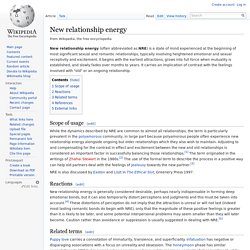
It begins with the earliest attractions, grows into full force when mutuality is established, and slowly fades over months to years. It carries an implication of contrast with the feelings involved with "old" or an ongoing relationship. Scope of usage[edit] While the dynamics described by NRE are common to almost all relationships, the term is particularly prevalent in the polyamorous community, in large part because polyamorous people often experience new relationship energy alongside ongoing but older relationships which they also wish to maintain. NRE is also discussed by Easton and Liszt in The Ethical Slut, Greenery Press 1997. [edit] Related terms[edit] Puppy love carries a connotation of immaturity, transience, and superficiality. Values within polyamory. Polyamory, the lifestyle or choice of having multiple mutually aware and consenting loving relationships, often requires a degree of negotiation and individual choice to reach a solid basis for relationships.
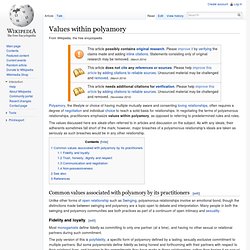
In negotiating the terms of polyamorous relationships, practitioners emphasize values within polyamory, as opposed to referring to predetermined rules and roles. The values discussed here are ideals often referred to in articles and discussion on the subject. As with any ideals, their adherents sometimes fall short of the mark; however, major breaches of a polyamorous relationship's ideals are taken as seriously as such breaches would be in any other relationship. Common values associated with polyamory by its practitioners[edit] Fidelity and loyalty[edit] Most monogamists define fidelity as committing to only one partner (at a time), and having no other sexual or relational partners during such commitment. Trust, honesty, dignity and respect[edit] Terminology within polyamory. Terminology within polyamory looks at the evolution and meaning of the word "polyamory" itself, as well as alternate definitions and concepts which closely relate to it.
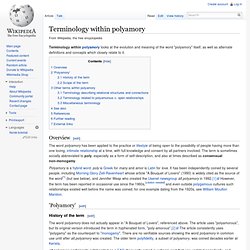
Overview[edit] 'Polyamory'[edit] History of the term[edit] The word polyamory does not actually appear in "A Bouquet of Lovers", referenced above. The article uses "polyamorous", but its original version introduced the term in hyphenated form, "poly-amorous".[2] The article consistently uses "polygamy" as the counterpart to "monogamy". Alt.polyamory participants collaborated on a FAQ (frequently asked questions) post that was updated periodically, and included the group's definition of "polyamory". Polyamory means "loving more than one". In 1999, Morning Glory Zell-Ravenheart was asked by the editor of the Oxford English Dictionary to provide a definition of the term (which the dictionary had not previously recognised). Compersion. Polyamory, often abbreviated as poly, is often described as "consensual, ethical, and responsible non-monogamy.
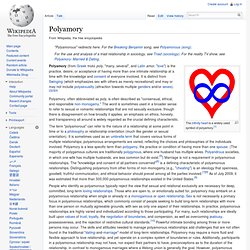
" The word is sometimes used in a broader sense to refer to sexual or romantic relationships that are not sexually exclusive, though there is disagreement on how broadly it applies; an emphasis on ethics, honesty, and transparency all around is widely regarded as the crucial defining characteristic. Terminology[edit] Most definitions center on the concepts of being open to, or engaging in, multiple loving relationships (of whatever form or configuration) wherein all parties are informed and consenting to the arrangement.
Members of the newsgroup alt.polyamory collaborated on a FAQ (frequently asked questions) post that was updated periodically, and included the group's definition of "polyamory". The 1997 version,[15] which has been archived online, contains this definition: Polytrothism. De la poligamia al «poliamor»: cuantos más, ¿mejor? Mientras el fiscal general de British Columbia, en Canadá, está abogando para que se levante la prohibición contra la poligamia en ese provincia del país, la Asociación Canadiense en Defensa del Poliamor está por tramitar ante el Tribunal Supremo de Canadá la legalización de los así llamados multi-partner unions.

O lo que es lo mismo, los “matrimonios” de grupos o «poliamor». La fenomenología de este tipo de uniones sería de lo más vario-pinto que uno se pueda imaginar: una mujer con tres hombres; tres hombres con dos mujeres; dos mujeres con cinco hombres… Podría pensarse que pro poligamia y pro poliamor se apoyan. Falso. La Asociación Canadiense en Defensa del Poliamor se opone a la poligamia porque, según ellos, es un estigma social que hace peligrar la causa «poliamor». Además de plantearse de si a más es mejor, quizá se están olvidando los niños. Primary and secondary (relationship) Primary and secondary (and occasionally tertiary) are words used by some polyamorists to distinguish between different degrees of relationship and to describe participants in those relationships (e.g.
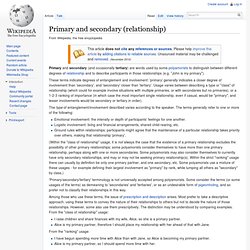
"John is my primary"). These terms indicate degrees of entanglement and involvement: 'primary' generally indicates a closer degree of involvement than 'secondary', and 'secondary' closer than 'tertiary'. Usage varies between describing a type or "class" of relationship (which could for example involve situations with multiple primaries, or with secondaries but no primaries), or a 1-2-3 ranking of importance (in which case the most important single relationship, even if casual, would be "primary"; and lesser involvements would be secondary or tertiary in order). The type of entanglement/involvement described varies according to the speaker. The terms generally refer to one or more of the following: 'Primary/secondary/tertiary' terminology is not universally accepted among polyamorists. Poliamor. El corazón infinito es un símbolo frecuente del poliamor.[1] Poliamor es un neologismo que significa tener más de una relación íntima, amorosa, sexual y duradera de manera simultánea con varias personas, con el pleno consentimiento y conocimiento de todos los amores involucrados.
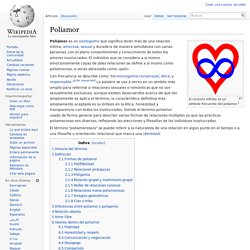
El individuo que se considera a sí mismo emocionalmente capaz de tales relaciones se define a sí mismo como poliamoroso, a veces abreviado como «poli». Con frecuencia se describe como "no-monogamia consensual, ética, y responsable. "[cita requerida] La palabra se usa a veces en un sentido más amplio para referirse a relaciones sexuales o románticas que no son sexualmente exclusivas, aunque existen desacuerdos acerca de qué tan ampliamente se aplica el término; la característica definitiva más ampliamente aceptada es su énfasis en la ética, honestidad y transparencia con todos los involucrados. Polyamory.